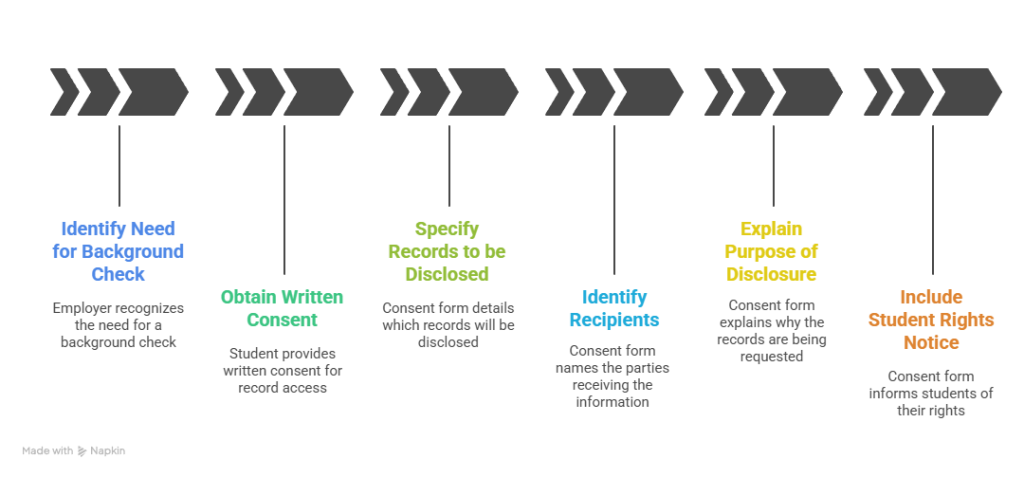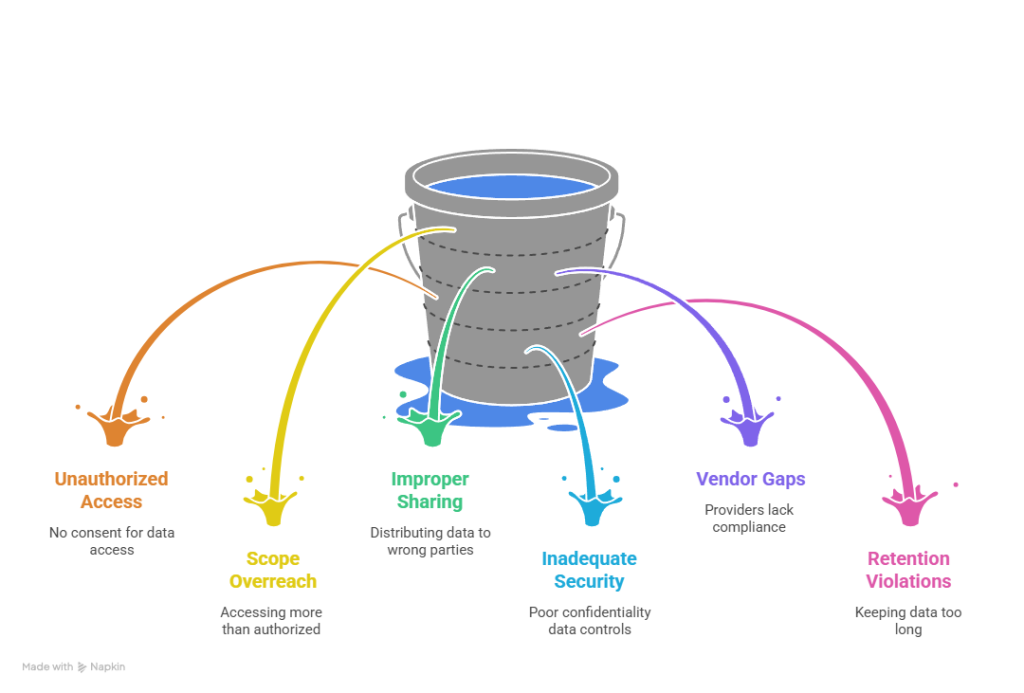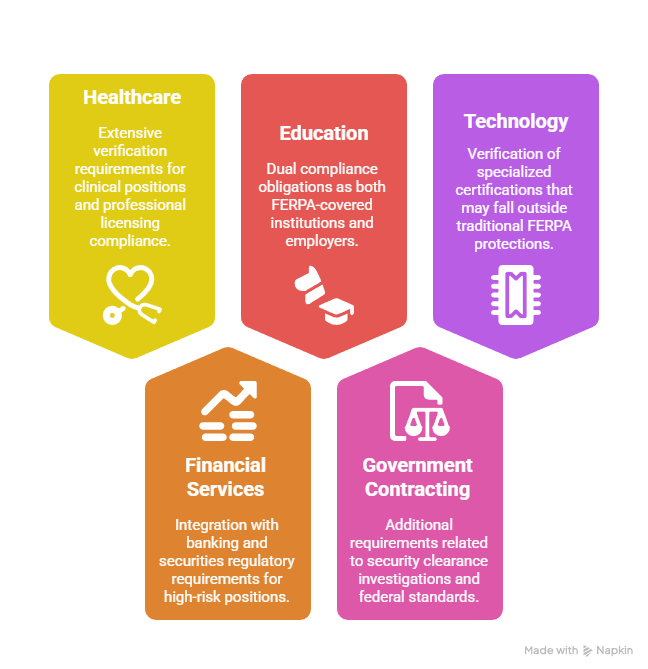FERPA compliance in background checks requires employers to understand when educational records fall under federal protection and how to properly obtain consent before screening educational history. Navigating these regulations properly protects both educational institutions and employers from legal liability while ensuring fair hiring practices.
Key Takeaways
- FERPA protects student educational records at institutions receiving federal funding, requiring written consent before disclosure to third parties including employers.
- Directory information like names, dates of attendance, and degrees earned can typically be released without consent unless students have specifically opted out.
- Employers must obtain proper authorization from candidates before requesting educational records and should work with FERPA-compliant background screening providers.
- Educational institutions maintain discretion over record disclosure policies, with some requiring specific forms or procedures beyond basic FERPA requirements.
- Third-party background check companies must follow strict protocols when accessing educational data to maintain compliance with both FERPA and FCRA regulations.
- Violations of FERPA compliance can result in loss of federal funding for institutions and legal liability for employers conducting improper educational screenings.
What Is FERPA and How Does It Affect Background Checks?
The Family Educational Rights and Privacy Act (FERPA) fundamentally shapes how employers can access and use educational information during the hiring process. This federal law, enacted in 1974, protects the privacy of student education records and gives students certain rights over their educational information. For HR professionals and employers, understanding FERPA compliance background checks is essential to avoid legal pitfalls while making informed hiring decisions.
FERPA applies to educational agencies and institutions that receive federal funding, which includes virtually all public schools and most private colleges and universities. The law creates a framework that balances student privacy rights with legitimate needs for information disclosure. When employers conduct background screenings that include educational verification, they must navigate FERPA requirements carefully to ensure compliance. The intersection of FERPA and employment screening creates unique challenges that require specialized knowledge. Unlike other types of background check information, educational records receive special federal protection that can complicate standard verification processes. Modern hiring practices increasingly rely on comprehensive background screening to verify candidate qualifications and assess potential risks, making FERPA compliance an essential component of effective hiring programs.
Key FERPA Provisions for Employers
FERPA establishes several critical provisions that directly impact employment background checks. The law generally prohibits educational institutions from disclosing personally identifiable information from student records without written consent. However, certain exceptions exist that allow for disclosure under specific circumstances, including directory information and legitimate educational interests.
Educational institutions must provide annual notification to students about their FERPA rights, including the right to inspect their records and request corrections. Students also have the right to control disclosure of their information and can opt out of directory information sharing. These rights continue even after graduation, meaning former students retain control over their educational records indefinitely.
Scope of FERPA Protection
FERPA protection extends to all educational records maintained by covered institutions, regardless of the format or storage method used. This includes paper files, electronic databases, video recordings, photographs, and any other medium containing personally identifiable student information.
The law defines "education records" broadly to include any records directly related to a student that are maintained by an educational agency or institution. This definition encompasses academic transcripts, disciplinary records, financial aid information, health records maintained by schools, and correspondence between students and faculty.
Understanding Directory Information vs. Protected Educational Records
The distinction between directory information and protected educational records forms the cornerstone of FERPA compliance background checks. Directory information represents basic details that institutions can typically disclose without student consent, unless the student has specifically opted out of such disclosures. This category usually includes names, addresses, telephone numbers, email addresses, dates of attendance, enrollment status, degrees received, and honors earned.
| Directory Information (Generally Disclosable) | Protected Records (Consent Required) |
| Student name and contact information | Grades and academic transcripts |
| Dates of attendance and enrollment status | Disciplinary records and sanctions |
| Degrees, honors, and awards received | Financial aid and payment information |
Understanding this fundamental distinction helps employers structure their verification requests appropriately while avoiding potential compliance violations. The opt-out provisions for directory information add another layer of complexity to educational verification processes.
Navigating Institutional Variations
Different educational institutions implement varying interpretations of directory information categories, creating challenges for employers conducting multi-institutional verification. Private colleges may define directory information more restrictively than public universities, while specialized institutions like medical or law schools may have unique requirements based on professional accreditation standards.
Seasonal and timing factors can also affect directory information availability. Some institutions limit directory information disclosure during certain periods, such as final exam weeks or graduation ceremonies, to protect student privacy during sensitive times.
FERPA Consent Requirements for Background Screening
Obtaining proper consent represents the most critical aspect of FERPA compliance background checks for employers. Written consent must be obtained from the student or former student before accessing protected educational records, and this consent must meet specific federal requirements. The consent must specify which records will be disclosed, identify the parties receiving the information, and explain the purpose of the disclosure.

- Signed and Dated Authorization: Valid FERPA consent requires student signature with current date
- Specific Record Description: Clear identification of which educational records will be disclosed
- Purpose Statement: Explicit explanation of why the records are being requested
- Recipient Identification: Names of parties who will receive the educational information
- Student Rights Notice: Information about student rights regarding record disclosure
Third-party background screening companies play a crucial role in managing consent requirements effectively. The quality of consent management can significantly impact both compliance effectiveness and verification turnaround times.
Best Practices for Consent Documentation
Implementing robust consent documentation procedures protects employers from compliance violations while streamlining the verification process. Consent forms should clearly explain what educational information will be requested and how it will be used in the hiring decision. Candidates should understand their rights regarding educational record disclosure and have opportunities to address any concerns before providing consent. Proper documentation also supports compliance with the Fair Credit Reporting Act (FCRA), which governs consumer reporting agencies conducting background checks.
Managing Consent Across Multiple Institutions
Complex educational backgrounds often require consent management across multiple institutions, creating administrative challenges for both employers and candidates. Graduate degree holders may have attended undergraduate, graduate, and professional schools, each with distinct consent requirements and verification procedures.
Systematic consent management becomes essential when dealing with candidates who have attended multiple institutions or completed various educational programs. Some employers implement centralized consent systems that capture comprehensive authorization for all potential educational verification needs.
How Educational Institutions Handle FERPA Requests
Many colleges and universities use third-party verification services like the National Student Clearinghouse to handle routine degree verification requests. These services streamline the verification process while maintaining FERPA compliance through standardized procedures and consent mechanisms. However, institutions retain ultimate control over their disclosure policies and may impose additional requirements beyond federal minimums.
| Verification Method | Typical Information Available | Processing Time | Cost Range |
| National Student Clearinghouse | Enrollment dates, degrees, honors | 1-3 business days | $5-15 |
| Direct institutional contact | Comprehensive records, transcripts | 5-10 business days | $10-50 |
| Third-party verification services | Customized verification packages | 3-7 business days | $15-75 |
Successfully navigating institutional verification systems requires understanding each school's specific requirements and procedures. Building relationships with institutional registrars and verification offices can improve response times and reduce processing complications.
International and Specialized Institution Considerations
International educational institutions present unique challenges for FERPA compliance since they may not be subject to U.S. federal privacy laws. However, many international schools maintain similar privacy protections and may require specific procedures for releasing student information to U.S. employers.
Specialized institutions such as military academies, religious colleges, or professional schools may have additional privacy requirements beyond standard FERPA protections. These institutions often serve unique populations or maintain special relationships with government agencies or professional organizations that influence their record disclosure policies.
FERPA Compliance for Third-Party Background Check Companies
Third-party background screening companies must maintain strict FERPA compliance protocols when accessing educational information for employer clients. These companies act as intermediaries in the verification process, requiring specialized knowledge of both FERPA requirements and institutional procedures. Their compliance programs must address consent management, record handling, and disclosure limitations to protect student privacy rights while serving legitimate employer verification needs. Professional screening companies typically maintain relationships with educational institutions and verification services to streamline the compliance process. They understand varying institutional requirements and can navigate complex verification procedures on behalf of employer clients.
The specialization that third-party providers bring to FERPA compliance can significantly benefit employers who lack internal expertise in educational privacy requirements. However, the delegation of compliance responsibilities does not eliminate employer liability for FERPA violations that may occur during the verification process.
Vetting Background Check Providers for FERPA Compliance
Due diligence in selecting background screening partners includes evaluating their FERPA compliance capabilities and procedures. Providers should demonstrate clear understanding of educational privacy requirements and maintain documented policies for handling protected information. They should also provide transparency about their verification methods and institutional relationships to help employers assess compliance effectiveness. Regular monitoring of vendor compliance helps employers maintain their own FERPA obligations while leveraging third-party expertise.
Technology and System Integration
Modern background screening companies increasingly rely on technology platforms to manage FERPA compliance efficiently while providing transparent reporting to employer clients. These systems must integrate consent management, institutional communication, and secure record storage while maintaining audit trails for compliance monitoring.
Integration capabilities become particularly important when employers use multiple vendors or maintain internal systems for managing background check processes. However, system integration must maintain appropriate security controls and access limitations to protect sensitive educational information throughout the verification workflow.
Common FERPA Violations in Employment Screening
Understanding common FERPA violations helps employers avoid compliance pitfalls that could result in legal liability and regulatory sanctions. The most frequent violations involve accessing educational records without proper consent, exceeding the scope of authorized disclosures, and failing to maintain appropriate record security. These violations can occur even when employers have good intentions but lack understanding of FERPA requirements.

- Unauthorized Record Access: Requesting protected information without proper student consent or authorization
- Scope Overreach: Accessing records beyond what was specifically authorized in consent documentation
- Improper Information Sharing: Distributing educational records to unauthorized parties within the organization
- Inadequate Security Measures: Failing to protect educational information with appropriate confidentiality controls
- Vendor Compliance Gaps: Using screening providers who lack proper FERPA compliance procedures
- Record Retention Violations: Keeping educational information longer than necessary or appropriate
Proactive identification of these warning signs helps employers address compliance issues before they result in violations. Regular compliance audits and staff training programs can identify potential problems and ensure consistent application of FERPA requirements across the organization.
Systemic vs. Individual Violations
FERPA violations can occur at both individual and systemic levels, with different implications for employer liability and regulatory response. Individual violations typically involve specific instances of improper record access or disclosure, while systemic violations indicate broader compliance program failures that affect multiple candidates or verification processes.
Systemic violations often result from inadequate policies, insufficient training, or flawed technological systems that create ongoing compliance risks. Individual violations may indicate isolated mistakes that can be addressed through targeted corrective actions and improved oversight procedures.
Consequences of FERPA Non-Compliance
FERPA violations can result in severe consequences for both educational institutions and employers involved in improper record disclosure or access. For educational institutions, the most serious penalty involves loss of federal funding, which could be financially devastating for schools that rely on government support. The Department of Education has authority to terminate funding for institutions that demonstrate a pattern of FERPA violations or fail to correct compliance deficiencies within required timeframes. Employers face different but equally serious consequences for FERPA violations in background screening processes. Legal liability can include civil lawsuits from affected individuals, regulatory investigations, and potential criminal charges in cases involving intentional violations.
The reputational impact of FERPA violations extends beyond immediate legal consequences to affect long-term business relationships and market position. Organizations known for privacy violations may struggle to attract quality candidates, maintain institutional partnerships, or secure business relationships with privacy-conscious clients.
Financial and Legal Penalties
The financial consequences of FERPA violations can be substantial, particularly when combined with related regulatory violations or civil litigation. While FERPA itself primarily provides for funding termination as a penalty for educational institutions, employers may face significant costs through private litigation, regulatory fines from other agencies, and remediation expenses.
Legal defense costs alone can be substantial when FERPA violations result in litigation or regulatory investigations. Complex privacy law cases often require specialized legal expertise and extensive discovery processes that can extend over multiple years.
Operational and Strategic Impacts
FERPA compliance failures can create significant operational disruptions that affect hiring processes, vendor relationships, and internal procedures. Employers may need to suspend educational verification activities while implementing corrective measures, potentially delaying critical hiring decisions and affecting business operations.
Long-term strategic impacts may include increased compliance costs, more restrictive verification procedures, and enhanced oversight requirements that permanently affect operational efficiency. Some organizations find that recovery from major compliance failures requires fundamental changes to their approach to background screening and privacy management.
Best Practices for FERPA-Compliant Background Checks
Implementing comprehensive best practices for FERPA compliance background checks requires systematic attention to consent management, vendor selection, and internal procedures. Organizations should develop written policies that clearly define roles and responsibilities for educational record handling while establishing accountability mechanisms for compliance monitoring. These policies should address both routine verification procedures and exception handling for complex situations that may arise during the screening process.
- Policy Development: Create comprehensive written policies covering FERPA compliance requirements and educational record handling procedures
- Vendor Management: Establish rigorous evaluation and monitoring procedures for background screening providers
- Staff Training: Implement regular training programs covering FERPA requirements and compliance procedures
- Technology Integration: Deploy systems that support consent tracking, secure storage, and audit trail maintenance
- Compliance Monitoring: Develop ongoing audit procedures to identify and address potential violations
- Documentation Standards: Maintain comprehensive records of all educational verification activities and compliance efforts
Training programs for HR professionals and hiring managers should cover FERPA requirements, consent procedures, and proper handling of educational information. Technology solutions can support FERPA compliance through automated consent tracking, secure record storage, and audit trail maintenance.
Implementation Checklist for Employers
Organizations implementing FERPA compliance programs should follow systematic approaches that address all critical compliance components. This includes developing comprehensive policies, selecting qualified vendors, training staff appropriately, and establishing ongoing monitoring procedures. The implementation process should be phased to ensure thorough coverage while minimizing operational disruption. Regular review and updating of compliance procedures ensures continued effectiveness as regulations evolve and organizational needs change.
Documentation and Record Management
Effective FERPA compliance requires comprehensive documentation of all educational verification activities, including consent collection, verification requests, institutional responses, and record retention decisions. This documentation serves multiple purposes, including compliance demonstration, audit support, and legal defense preparation.
Record retention policies must balance compliance requirements with practical storage limitations and privacy considerations. Developing clear retention schedules and secure disposal procedures helps manage these competing considerations while maintaining compliance effectiveness.
Industry-Specific FERPA Considerations
Different industries face varying FERPA compliance challenges based on their hiring patterns, regulatory requirements, and typical educational verification needs. Healthcare organizations often require detailed educational verification for licensed professionals, creating more complex FERPA compliance obligations. Financial services companies must balance FERPA compliance with other regulatory requirements such as those imposed by banking regulators and securities authorities.

- Healthcare: Extensive verification requirements for clinical positions and professional licensing compliance
- Financial Services: Integration with banking and securities regulatory requirements for high-risk positions
- Education: Dual compliance obligations as both FERPA-covered institutions and employers
- Government Contracting: Additional requirements related to security clearance investigations and federal standards
- Technology: Verification of specialized certifications that may fall outside traditional FERPA protections
Educational institutions themselves face unique challenges when conducting background checks on potential employees while maintaining their own FERPA obligations. Technology companies increasingly require verification of specialized technical education and certifications that may fall outside traditional FERPA protections.
Healthcare Sector Considerations
Healthcare organizations frequently require comprehensive educational verification for clinical positions, creating heightened FERPA compliance obligations. Medical schools, nursing programs, and other healthcare educational institutions may maintain additional privacy protections beyond basic FERPA requirements due to the sensitive nature of clinical training and patient interaction components.
Professional licensing requirements in healthcare create additional complexity for FERPA compliance. State licensing boards may require specific educational verification procedures that must be coordinated with FERPA consent requirements, and these requirements can vary significantly between states and healthcare specialties.
Financial Services Compliance Integration
Financial services organizations must integrate FERPA compliance with extensive regulatory requirements from banking, securities, and consumer protection agencies. This integration challenge requires comprehensive compliance programs that address multiple regulatory frameworks simultaneously while maintaining operational efficiency.
Anti-money laundering and fraud prevention requirements in financial services may create additional documentation and verification needs that must be balanced with FERPA privacy protections. These competing requirements necessitate careful policy development and ongoing compliance monitoring.
Conclusion
FERPA compliance in background checks requires careful attention to student privacy rights, proper consent procedures, and institutional requirements that vary across educational organizations. Employers must balance their legitimate need for educational verification with federal privacy protections through systematic compliance programs that address consent management, vendor oversight, and internal procedures. Understanding the distinction between directory information and protected educational records helps organizations structure appropriate verification requests while avoiding common compliance pitfalls. Success in FERPA compliance ultimately depends on ongoing education, proactive policy development, and partnership with knowledgeable background screening providers who understand the complex intersection of educational privacy and employment law.
Frequently Asked Questions
Can employers access student disciplinary records through background checks under FERPA?
No, student disciplinary records are protected educational records under FERPA that require explicit written consent from the student before disclosure. Most educational institutions will not disclose disciplinary information even with consent unless required by law or court order.
How long do FERPA consent requirements remain valid for background check purposes?
FERPA does not specify consent expiration periods, but educational institutions may impose their own time limits. Best practice suggests obtaining fresh consent for each background check to ensure current authorization and avoid potential compliance issues.
Are private schools subject to FERPA requirements for employment background checks?
Private schools that receive federal funding are subject to FERPA requirements. However, private institutions that do not receive federal funds are not bound by FERPA, though they may maintain similar privacy policies voluntarily.
What information can employers verify without student consent under FERPA directory information exceptions?
Directory information typically includes names, dates of attendance, enrollment status, degrees earned, and honors received. However, students can opt out of directory information disclosure, and institutions define their own directory information categories.
How do FERPA requirements interact with Fair Credit Reporting Act compliance in background screening?
FERPA and FCRA create overlapping compliance obligations for employers conducting educational background checks. Both laws require proper consent, though FERPA focuses on student privacy while FCRA emphasizes consumer protection and accuracy.
Can employers use social media or other sources to verify educational claims if FERPA compliance is too complex?
While social media verification is not subject to FERPA, it lacks reliability and may violate other employment laws. Employers should use FERPA-compliant verification methods through legitimate channels to ensure accurate and legally defensible educational verification.
Additional Resources
- U.S. Department of Education FERPA Guidance for Employers
https://www2.ed.gov/policy/gen/guid/fpco/ferpa/index.html - National Student Clearinghouse Verification Services
https://www.studentclearinghouse.org/verification/ - Federal Trade Commission Background Screening Guide
https://www.ftc.gov/tips-advice/business-center/guidance/using-consumer-reports-what-employers-need-know - Professional Background Screening Association Compliance Resources
https://www.professionalbackground.org/ - Society for Human Resource Management Background Check Guidelines
https://www.shrm.org/resourcesandtools/hr-topics/risk-management/pages/background-checks.aspx - Equal Employment Opportunity Commission Background Check Guidance
https://www.eeoc.gov/laws/guidance/background-checks-what-employers-need-know

GCheck Editorial Team
Meet the GCheck Editorial Team, your trusted source for insightful and up-to-date information in the world of employment background checks. Committed to delivering the latest trends, best practices, and industry insights, our team is dedicated to keeping you informed.
With a passion for ensuring accuracy, compliance, and efficiency in background screening, we are your go-to experts in the field. Stay tuned for our comprehensive articles, guides, and analysis, designed to empower businesses and individuals with the knowledge they need to make informed decisions.
At GCheck, we're here to guide you through the complexities of background checks, every step of the way.






